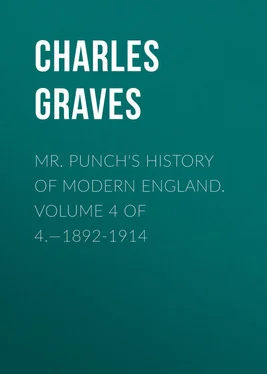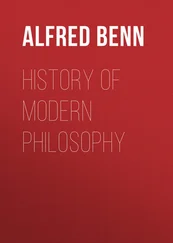Charles Graves - Mr. Punch's History of Modern England. Volume 4 of 4.—1892-1914
Здесь есть возможность читать онлайн «Charles Graves - Mr. Punch's History of Modern England. Volume 4 of 4.—1892-1914» — ознакомительный отрывок электронной книги совершенно бесплатно, а после прочтения отрывка купить полную версию. В некоторых случаях можно слушать аудио, скачать через торрент в формате fb2 и присутствует краткое содержание. ISBN: , Издательство: Иностранный паблик, Жанр: foreign_prose, foreign_humor, на английском языке. Описание произведения, (предисловие) а так же отзывы посетителей доступны на портале библиотеки ЛибКат.
- Название:Mr. Punch's History of Modern England. Volume 4 of 4.—1892-1914
- Автор:
- Издательство:Иностранный паблик
- Жанр:
- Год:неизвестен
- ISBN:http://www.gutenberg.org/ebooks/48405
- Рейтинг книги:5 / 5. Голосов: 1
-
Избранное:Добавить в избранное
- Отзывы:
-
Ваша оценка:
- 100
- 1
- 2
- 3
- 4
- 5
Mr. Punch's History of Modern England. Volume 4 of 4.—1892-1914: краткое содержание, описание и аннотация
Предлагаем к чтению аннотацию, описание, краткое содержание или предисловие (зависит от того, что написал сам автор книги «Mr. Punch's History of Modern England. Volume 4 of 4.—1892-1914»). Если вы не нашли необходимую информацию о книге — напишите в комментариях, мы постараемся отыскать её.
Mr. Punch's History of Modern England. Volume 4 of 4.—1892-1914 — читать онлайн ознакомительный отрывок
Ниже представлен текст книги, разбитый по страницам. Система сохранения места последней прочитанной страницы, позволяет с удобством читать онлайн бесплатно книгу «Mr. Punch's History of Modern England. Volume 4 of 4.—1892-1914», без необходимости каждый раз заново искать на чём Вы остановились. Поставьте закладку, и сможете в любой момент перейти на страницу, на которой закончили чтение.
Интервал:
Закладка:
Punch , it is to be feared, did not credit the Balkan League with exalted ideals in entering on the conflict with Turkey in 1912. Bulgaria, in his cartoon of August 28, challenges Turkey, at grips with Italy, to mortal combat, and Turkey replies: "Certainly," adding to Italy, "I hope you won't think me discourteous if I cannot continue to give you my undivided attention." Two months later we are shown the Great Powers all sitting on the seething pot of "Balkan troubles" but unable to keep the lid down. By November a "New Eagle" with four heads – Bulgaria, Serbia, Montenegro and Greece – is seen approaching the door of the Council of Europe. More acute in its reading of the signs of the times is the picture of Turkey, a sinister figure, rubbing his hands as he reads the placard: "Austria threatens Serbia. European Crisis," and saying, "Good! If only all those other Christian nations get at one another's throats, I may have a dog's chance yet" – a situation realized by the launching of the Austrian ultimatum to Serbia in July, 1914. Early in December an armistice was agreed to, and by the middle of the month a conference of Balkan delegates assembled in London. The deliberations of the Peace Conference continued till the end of the year, but in the Christmas cartoon of "Prince Charming and the Sleeping Beauty," Sir Edward Grey has not yet succeeded in inducing Peace to wake up. As a matter of fact, the Conference was suspended on January 6, 1913, on the 26th the Balkan delegates broke off further negotiations with the Porte, and on February 3 war was resumed. Punch's comment on the threatened intervention of Roumania was severe but not unmerited; the "Bayard of Bukharest" observes politely to Bulgaria, "I am sure, dear old friend, you will wish to recompense me for not stabbing you in the back from behind in the previous bout, and I am therefore proposing to anticipate your kindness by making off with your coat (Silistria)." Sir Edward Grey's hope, expressed in the House of Commons in March, that Turkey would now confine its energies to "consolidating" itself in Asia Minor, met with ironical approval from Punch , who in the following month represented Turkey responding to Europa's complacent assurance that the war was "practically over" with the still more complacent comment: "My felicitations, Madam. Everything seems to point to the outbreak of a sanguinary peace." And unfortunately the cynical anticipation was only too well verified in the sequel. King Nicholas's defiance marked the opening stages of the new conflict – typified in the Montenegrin bantam blocking the road for the great Powers, but getting out of the way at the last moment. Skutari was occupied by troops of the Powers on May 14, and on May 30 the Treaty of Peace between the Allies and the Porte was signed at St. James's Palace. But Punch , in his cartoon of "Peace comes to Town," was not unfair in making Sir Edward Grey adjure the fair damsel riding behind him to sit close and not slip off as on the last occasion they fared that way together. So many outstanding questions remained unsettled that a pacific solution was impossible; the Balkan war was resumed on June 30. Bulgaria put up a great fight against the Serbians and Greeks, but the advance of the fresh Roumanian army into her territory rendered her position desperate. Punch had already shown Turkey offering its services as benevolent mediator to the Balkan "allies." Before the end of the month the Turks had re-entered the field and re-occupied Adrianople only three months after they had been driven out. "Quite like old times, being back here," the Turk says to Dame Europa in Punch's cartoon, and when Europa replies, "Ah! but you'll be kicked out, you know," he retorts calmly, "Well, that'll be like old times too." An armistice was signed on July 31, and the second Treaty of Peace was signed by Bulgaria, Greece, Montenegro and Serbia on August 10. Bulgaria, whose losses in the two wars had been very heavy, was seriously penalized by the new adjustment of boundaries and the consequent loss of territory. Roumania was cordially congratulated by the Kaiser for her "wise and statesmanlike policy," and Greece, who gained a vast acquisition of territory around Salonika, expressed through the mouth of King Constantine – King George had been assassinated at Salonika in March – her indebtedness to Germany for the war training of her officers. Punch's comment was sardonic. In " Deutschland über Alles " the King of the Hellenes observes to the Kaiser, "Our success, as you know, was entirely due to you," and the Kaiser replies: "Thanks, thanks," adding, aside, "I suppose he can't be referring to our organization of the Turkish army."
The Balkan Cockpit
The attitude of the Concert of Powers over the question of Adrianople is indicated in the cartoon in which Sir Edward Grey tells the Turk, the man in possession, that he will have to go, but that the Powers haven't decided who was to turn him out. European intervention proving hopeless, the matter was left for direct negotiations between Bulgaria and Turkey, with the result that the new frontier gave Turkey about one hundred square miles more territory together with Adrianople. Punch , on the eve of the signature of the treaty, anticipated the triumph of Turkey, who is seen pasting up, on the door of the Hotel Adrianople, a notice, "Under the same old management," over a previous notice, "Under entirely new management," and expressing regret at being unable to oblige Europa by retiring. Europa, with the Treaty of London in her hand, saves her face by replying with dignity: "Not at all. You may remember that at the very start I strongly insisted on the status quo ." The Powers had decided at the close of 1912 that Albania was to receive autonomy, but the International Commission of Control was unable to check guerrilla fighting between Serbians and Albanians. Europa found it, in Punch's phrase, a very difficult task to hush the infant Albania; and Prince William of Wied, chosen by the Powers as sovereign, or "Mpret" of Albania in November, 1913, excited more ridicule than sympathy during his brief and troubled tenure of office.
The Balkan wars, which began in an organized attempt to liberate Christians from the Turkish yoke, developed into an internecine struggle for aggrandisement amongst the members of the League. The Balkan Peninsula unhappily justified its description as "the cockpit of Europe," or, to quote the words of a traveller who visited it between the first and second wars: "one vast madhouse, where sanity seems ridiculous and folly wisdom." The Treaty of Bukharest, so far from allaying discord, only fomented the ambitions which precipitated the world conflict.
Ulster Bars the Way
France's reversion to three years' service – applauded by Punch in his cartoon " Pour la Patrie " – had been countered by the German Army Bill introduced by the new German Chancellor, Bethmann-Hollweg, in a somewhat ominous speech in April. Punch had already symbolized the acceleration of the armament race in his picture of Hans and Jacques, each bowed down under a tremendous burden of warlike equipment, exclaiming in rueful unison: "And I hear there's more to come."
Mr. Churchill's scheme of a naval holiday inspired hopes which were partially shared by Punch , but damped by the German Chancellor's speech on the ground that the idea had not been taken up as practical in England either by Parliament or public opinion. The renewal of Mr. Churchill's suggestion later in the year met with an even more unfavourable reception. Admiral Tirpitz makes his début in Punch as an apostle of German naval expansion; General Bernhardi had followed up his notorious book on Germany and the Next War with articles pointing to Ireland as an ally of Germany in the enemy's camp; and the outrages on Alsatian civilians by German officers at Zabern and Metz emphasized the danger of militarism at home as well as abroad. The incident was historic because it was the first notable example of the cleavage between the army and the people in Germany, the Radicals and Socialists having carried a vote of censure in the Reichstag against the Imperial Chancellor. The war closed all ranks for a time; but Zabern was a straw which showed how the wind was beginning to blow – the wind which became a tempest in the autumn of 1918.
Читать дальшеИнтервал:
Закладка:
Похожие книги на «Mr. Punch's History of Modern England. Volume 4 of 4.—1892-1914»
Представляем Вашему вниманию похожие книги на «Mr. Punch's History of Modern England. Volume 4 of 4.—1892-1914» списком для выбора. Мы отобрали схожую по названию и смыслу литературу в надежде предоставить читателям больше вариантов отыскать новые, интересные, ещё непрочитанные произведения.
Обсуждение, отзывы о книге «Mr. Punch's History of Modern England. Volume 4 of 4.—1892-1914» и просто собственные мнения читателей. Оставьте ваши комментарии, напишите, что Вы думаете о произведении, его смысле или главных героях. Укажите что конкретно понравилось, а что нет, и почему Вы так считаете.












